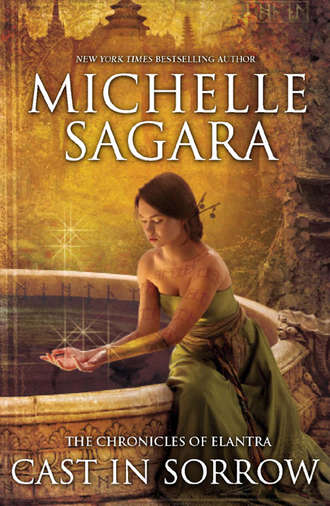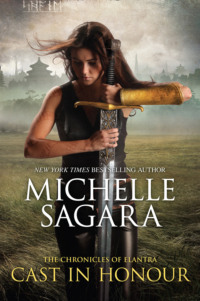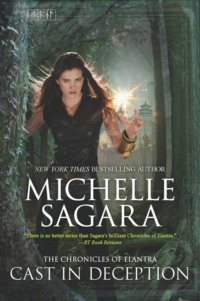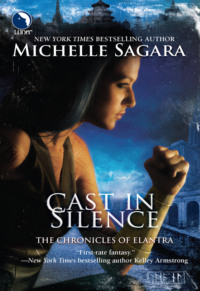
Полная версия
Cast in Sorrow
“There, if they’re lucky, they’re empowered. Somehow. Don’t give me that look. I wasn’t making lists. I don’t know how the effect is measured. But...the ceremony has an effect.”
“On all participants?” He gave the dress a pointed look.
She frowned. “I’m not sure. I’d guess no. But on some.”
Severn nodded.
“Some ambitious moron on the High Council came up with a great idea. It was during one of the Draco-Barrani wars.” She frowned. “I’m guessing not all adults are affected by the regalia in an obvious way. Maybe someone thought adults were less malleable. But anyway, one of the nameless High Lords suggested that if the regalia had subtle effects on the adults, it might have stronger, more useful effects on children. Those children would then be like a super–next generation, and they might make a difference in the wars.
“The High Lord of the time liked the idea.
“So twelve children were chosen. Teela was one of the twelve. Or maybe there were thirteen—they speak of twelve lost, and Teela’s not lost. The children were considered gifted; smarter, faster, that kind of thing. They all came from significant families.” She glanced past Teela, and caught a brief glimpse of Nightshade. “The children were brought to the West March.
“The denizens of the West March were not happy. Because they weren’t happy, they didn’t offer the visitors from the High Halls the hospitality of their homes; the children—and the Lords they traveled with—were placed in the Hallionne of the West March.”
“The Hallionne that’s considered unsafe by the rest of the Hallionne.”
Kaylin nodded. “It wasn’t considered unsafe at the time—but staying in the Hallionne was the equivalent of being told by family that they don’t have room for you and you should go to the nearest Inn.”
“The Barrani of the West March didn’t want the children exposed to the regalia?”
“No. But most of the Barrani of the West March aren’t Lords of the High Court, so they didn’t have a voice. They couldn’t prevent the children from appearing at the recitation—but they tried anyway. They died.”
“During the recitation?”
Kaylin nodded, remembering the cadence of Teela’s voice. Teela, who never really talked about anything except drinking and work. One of those Barrani had been her mother. “The children listened to the recitation. It was—it was a complicated tale. I think Teela said that a harmoniste and a Teller had been chosen by the heart of the green, and both collapsed the moment it was done. It was considered auspicious; most of the recitations have neither. Just the Lord of the West March.”
“A harmoniste and Teller have been chosen for the upcoming recitation.”
“I’m the harmoniste. Believe that I noticed.”
“What happened?”
Kaylin shrugged. “The children changed. It wasn’t obvious during the telling; it became obvious after. They’d returned to the Hallionne before it became clear how dangerous they were. They didn’t apparently feel much loyalty toward the Barrani; I think most of the Lords responsible for their journey died in the Hallionne at their hands.”
“How did Teela survive unchanged?”
“That would be the question.” She hesitated again. “The Ferals that almost killed us—”
“Don’t call them Ferals around the Barrani; it annoys them.”
“They haven’t come up with a better name. Fine. The Not Ferals that almost killed us are related, somehow, to the lost children the Barrani said were dead. When we were fighting in the forest before we reached Hallionne Bertolle, one of our attackers called Teela by name.
“And she answered. She called him by the name he used to use before he—before. Nightshade recognized the name: Terrano.” She hesitated again. She glanced around the smallish clearing; Nightshade wasn’t visible. “Severn, I think Nightshade wanted me to attend the regalia because of the lost children.”
“Was one of them his?”
Kaylin blinked.
The thought had honestly never occurred to her. Nightshade wasn’t married. He had no consort. But when the children had been taken to the West March—the same West March she was approaching—Nightshade had been a Lord of the High Court, and not Outcaste. She literally had no idea what his life had been like before the fiefs. He might have had a consort, a wife, of his own. Barrani loyalty was always situational; if Nightshade was made Outcaste, what were the odds that a wife of any position would choose to accompany him into the dismal exile of the fiefs?
“I...I don’t know. I have no idea if Nightshade has—or had—children.” And she wasn’t going to ask. But the thought was arresting and disturbing, and she tried, mostly successfully, to push it aside. “I don’t think the lost children want Teela dead. I think they want her to—finally—join them. It’s like they think she was left behind, or held back.”
“And Evarrim is aware of this.”
“Evarrim is a—”
Severn cleared his throat, and Kaylin took the hint. “The whole High Court is probably aware of it by now. Terrano wasn’t exactly subtle. I’d guess most, if not all, of the High Court is worried.”
“They don’t trust Teela.”
Kaylin rose. “They’re Barrani; they don’t trust anyone.” The small dragon sneezed in her ear. “I think,” she added, glaring at the small dragon, “we’re moving again.”
* * *
The forests of the West March, or its environs, weren’t exactly light-filled to begin with. The trees were too tall. But when evening began to set in, Kaylin missed the light. Moonlight was barely visible from where she was standing—and she’d chosen the spot because from here she could see at least one of the moons.
She stayed in range of Teela. She kept Severn more or less in line of sight. But what she wanted—what she missed about a city that was in theory vastly more crowded and consistently noisy—was a bit of privacy. There were no doors in the forest, and no small, enclosed space she could call her own.
But she didn’t have that in Elantra anymore, either. The attempt to assassinate Bellusdeo had not only destroyed her flat, it had destroyed a large chunk of the building itself.
The small dragon snapped at something large and chitinous that was crawling up her arm; the damn bug didn’t even crunch. “Do not breathe on it,” she said when he opened his little jaws.
The small dragon snapped its jaws shut and whiffled.
“Kitling.”
She looked up from a furious attempt to kill a buzzing, flying bloodsucker. The tone of Teela’s voice made insect blood loss a triviality. She walked away from the only obvious—to mortal vision—moonlight, making a beeline for Teela.
Teela was not the only Barrani to draw weapon; the entire clearing had fallen silent.
Kaylin listened. She heard nothing.
Even the insects were quiet for one long, drawn breath. Severn unwound his weapon chain—and to her surprise, that made almost no noise, either.
The Consort lifted her chin. “From the north,” she said. The Barrani turned.
In the forest, night was spreading across the ground.
Chapter 2
The Lord of the West March spoke three short phrases that Kaylin did not understand. Light flared in the forest, spreading across flattened undergrowth and fallen branches until it hit a wall of darkness it couldn’t penetrate.
The Consort was right: the wall of darkness existed only to the north of the group; to the west, east, and south the summoned light faded naturally. As Kaylin reached Teela’s side, the small dragon dug claws into her shoulders, throwing his wings wide. He almost dislodged the precariously embedded stick that kept most of her hair out of her eyes. Reaching up, she fixed this. She couldn’t afford to be half-blind. She also tried to remove him; in response he batted her hands away with his head.
And a hiss.
His wings, however, were rigidly spread. They were, Kaylin suddenly realized, covering half her face—and her left eye. She stopped trying to remove him, and instead turned to look at the moving, black wall through his wing.
“We have Ferals,” she said.
The Lord of the West March was less prone to be annoyed by her inaccurate description. “Where?”
“In the wall.” When he failed to answer, she added, “I see the darkness moving in as a wall. The light doesn’t breech it.”
“Lord Evarrim? Lady?”
“I see the...wall...that Lord Kaylin describes. I cannot see anything moving in it.”
“Lord Severn?”
Severn held a blade in each hand; he came to stand beside Kaylin, and then took one step forward. He didn’t set the chain spinning. “I see the shadow. I don’t see what it contains.”
Neither could Kaylin—with her right eye. But the translucent wing that covered the left eye clearly showed forest Ferals. She frowned. “There are three,” she said. She spoke softly, squinting. “I can’t be certain, but I think there are two Barrani behind the Ferals.”
“Do you recognize them?”
This was not a reasonable question to ask of a mortal, even a human Hawk. “No. Neither are Iberrienne, if that’s what you’re asking. I think one is female. They’re not obviously armed,” she added, aware that this didn’t mean they were harmless.
“An’Teela?”
For a long moment, Teela stared into the moving wall; the Barrani shifted formation, drawing into a tighter front line that faced north. “I see the shadow,” she finally said. “Lord Evarrim, can you bring it down?”
Evarrim replied tersely, “I have been making that attempt.” His tone made clear that it wasn’t wise to emphasize his failure.
The darkness wasn’t a flood; it was slow, but inexorable, and as it moved, it swallowed the edge of the light, changing the shape of safety in the clearing. The Ferals seemed content to move beneath its cover; they didn’t snarl, growl, or speak; they didn’t charge. Kaylin glanced at Ynpharion. He was instantly aware of her, but for the first time since the Lord of the West March had led this wilderness trek, his loathing and fury were directed at something other than Kaylin.
She didn’t ask him what he could see. At the moment, she knew. He saw the moving darkness, and he wanted to obliterate anything that was hidden within its folds. She readjusted the small dragon. Living masks were awkward.
“Is the darkness transforming the trees?” The Lord of the West March asked.
Kaylin frowned. “No, I don’t think so.”
“Does the light continue?”
That was what was wrong. “Yes. It does. It’s why I can see them at all.”
She heard a shout and turned; the other Barrani held their ground. “Incoming from the west.”
The Lord of the West March glanced once at his sister. “Call them back,” he told her softly.
The Consort’s eyes widened, their color darkening. She looked as if she wanted to argue but in the end, she did as he asked. Her commands, Kaylin understood. “Lord Kaylin, stand beside me. Under no circumstances are you to now run—or fight—on your own.” She lifted her chin, frowning. “Where is Lord Calarnenne?”
Kaylin froze. Nightshade was not standing within the boundaries of the Lord of the West March’s light. When he’d chosen to leave, she didn’t know—but she knew where he now was, because she could see him clearly. He had crossed the threshold of moving darkness, to the west of the farthest Feral, and he was now making a silent approach, using the cover of standing trees, toward one of the two Barrani who walked behind those Ferals.
As if, she thought, he had seen them. Maybe he had. Maybe the tiara that graced his brow at the whim of the heart of the green allowed it. She was only grateful that wasn’t the case with Teela.
Nightshade, don’t.
He failed to answer. Inasmuch as he could, he had shut her out entirely. And she knew what it would cost to force him to listen, or worse, obey.
You could not. He sounded amused. It is true that names are cages, Kaylin. But understanding the shape of the cage does not immediately give you the key.
They’re not who they were.
No. But Terrano approached your Teela; he had no desire to kill her. Something remains.
“Lord Kaylin?”
“He’s beyond the darkness,” was her flat reply.
Teela’s brows joined a moment over the bridge of her nose. She did not put her momentary disgust into words. Instead, she turned to the Lord of the West March. “If you will allow it, cousin, I will distract them while you retreat with the Consort.”
He shook his head. “There are three to the west, at a greater distance. Your ability with sword has always been impressive, but I am unwilling to sacrifice you in a staying action; we have lost too many already.”
“I am the only person present who might survive it.”
“Yes. That is problematic in its own right. What the fieflord chooses to do makes no material difference to his position; he is already Outcaste. We are ready.”
The light in the clearing grew harsher, brighter, before he had finished. Arrows flew in a volley; some struck the Ferals. None touched the Barrani behind them, although two splintered before they could. The darkness wavered, thinning under the renewed light.
“Follow the Lady, Lord Kaylin, if you cannot see the path itself. Step on nothing outside of its boundaries.” He drew sword. The Consort grabbed Kaylin’s arm.
“I’m the only person who can see—”
“Not for much longer,” the Consort said, voice the same texture as the edge of the sword she carried. “My brother is waking the heart of the forest, and we do not wish to be standing here when it fully responds.”
The Ferals snarled and leaped; one growled what sounded like a Barrani battle cry. The small dragon squawked; Kaylin said, “Go if you can help them.” He dug in instead, as the Lady began to run, still attached to Kaylin’s arm.
At their backs, the call of a horn shattered the silence.
Barrani words followed, some of them wedged between the growls and snarls.
* * *
If there was a path beneath the Consort’s feet, Kaylin couldn’t see it, but she didn’t doubt it was there. The Consort never hesitated; she didn’t stumble, she didn’t call a halt. The Barrani didn’t require it; what she saw, they saw. The only person to break small branches or crush undergrowth or stub her toes was Kaylin.
Severn saw as Kaylin did: a bunch of trees and small plants in a nighttime sky. He was not as important as Kaylin’s dress; no one grabbed his arm, no one dragged him, and no one treated him as if he was likely to get distracted and wander off.
But he sheathed his weapons for the run; the Barrani, with the single exception of the Consort, did not. The small dragon had folded his wings at the start of the run, but he perched on her shoulder, rather than draping himself across both, as he usually did. None of them looked back; none of them mentioned the Lord of the West March or those who might have stayed by his side.
Nor did they mention Nightshade; they probably hoped he’d be killed.
Kaylin was good at running. But the years in which she’d learned to run in pursuit of a criminal rather than in terror from one made this flight hard. She knew they had the numbers to stand and fight—and they’d just taken a greater part of that number on a run through moonlit forest, leaving one of the few Barrani High Lords she actually liked to stand on his own.
As incentive, it wasn’t.
Even her certain sense that she wasn’t a match for any of the five she’d personally spotted didn’t make it better.
It is not easier for the Consort, a disembodied voice said. Nightshade’s. But she understands her duty and her responsibility. If the Lord of the West March is lost, he will be replaced. If the Consort is lost, the replacement will be difficult, and it is all but guaranteed to be a long time coming. There will be any number of Lords willing to make the attempt to fill her role—but very few will succeed, and if they fail, they are also lost to us.
She grimaced as the top side of her feet hit the underside of a raised branch and sent her staggering. Her weight didn’t unbalance the Consort, but it was close.
And if she is lost, he continued, there will almost certainly be a succession war. You have never seen one.
Her death won’t kill the High Lord.
No. But she has not yet had children. If she perishes here, she will not. Any Barrani who can touch the lake of life will therefore be mother to the High Lord to come. I understand that politics have never been of import in your life, but you are a Lord of the High Court and you must come to understand at least the obvious basics.
A branch slapped her in the face, which caused the small dragon to hiss in fury. “Sorry,” she muttered. “I’m not used to carrying a passenger.”
Where are you? Kaylin all but demanded.
I am at the side of the Lord of the West March. He has not fallen, and, Kaylin, he will not. You are only a few miles from the edge of his domain, and in his domain, he has strength that not even the High Lord in the High Halls possesses.
“Nightshade,” she said, in out-of-breath Elantran, “is fighting beside your brother now. They’re both alive.”
The Consort didn’t reply. She didn’t appear to have heard. But she gave the arm she was using as a rope line a brief squeeze—and then increased the pace. This had one advantage: it gave Kaylin very little time to think.
* * *
There was no obvious moment at which the forest transformed. It didn’t fall away; it didn’t immediately open up into an obvious clearing. The path the Barrani followed remained invisible to Kaylin; it didn’t widen or flatten enough for carriages or wagons to use. Which made Kaylin wonder exactly how the carriages the High Court had abandoned would have made it here in the first place.
In spite of this, she knew when they’d arrived. Something about the forest changed; it took her a moment to realize what. She could hear birds. It was still night, but the differing shades of gray were clearer. The Barrani party slowed to a walk. They did not, in any other way, relax.
Nor did the Consort let go of Kaylin’s arm; her fingers were now tingling, the Consort’s grip was so tight. “Let me do the speaking,” she said. To Kaylin’s surprise, she spoke in very quiet Elantran.
It was a warning, of sorts. There was no one in sight—present company excepted—to speak to. Severn approached the Consort but stopped ten yards back. The rest of the Barrani remained armed; Severn chose to leave both hands loose by his side. It was hard to tell if he was paler, or if the run had exhausted him, but if it had, he failed to acknowledge it.
He waited.
Birds sang. From within the group, birds apparently answered. Kaylin felt less relieved about the sound than she had moments ago. The arrows that studded the path in rapid succession didn’t help. Or it didn’t help her; the Barrani surrounded her and didn’t even blink; clearly this was the Barrani version of a gate check. Two of the Lords of the High Court lifted bows of their own; after a moment two arrows arched into the air, landing with audible thunks in the trees high above where the Consort stood.
The Consort raised an arm; moonlight touched her fingers and her hands, silvering her skin in a way Kaylin found disturbing. It wasn’t magic—it wasn’t the magic that caused Kaylin’s skin to ache until it felt raw. But it wasn’t natural; the moonlight touched nothing else here. Kaylin couldn’t see the moon for the trees. Arrows flew again. Three, this time.
Kaylin took a step back, or tried; the Consort had not released her arm. She opened—and closed—her mouth. The Consort’s eyes were midnight-blue. They were standing in the home of the Lord of the West March, the seat of his power. This was supposed to be safe ground. But Kaylin knew the Barrani, and there was no mistaking that eye color as the rest of the Consort’s skin began, like her raised hand, to shine.
Silver had never seemed so wrong. Pale skin had never seemed so threatening. It was not a color Kaylin associated with life. She was afraid. She was afraid for the Consort. The fear of her hatred, her anger, and her endless disapproval was swallowed by it.
Kaylin, what is wrong?
She didn’t have the words for it.
Kaylin!
Look, she told him, whispering although no one else in the world could hear. Look through my eyes. She felt his presence for a moment.
Tell me what’s happened. Quickly, Kaylin.
She didn’t use words; she didn’t have to use them. He saw what she had seen. Tell me I don’t have to worry, she thought.
You will not believe it. Not when we speak like this.
The Consort moved her hand, opening her palm and turning it up toward the sky. Three arrows flew. To Kaylin’s surprise, they didn’t hit anything; they were struck—in almost perfect unison, by three arrows traveling in the opposite direction. The Consort watched the arrows fall, her chin slowly lowering as she did.
Her hair was bound, like Kaylin’s; unlike Kaylin’s, the run hadn’t dislodged any of it. Teela approached—without any signal from the Consort—and released the Consort’s hair. It fell down her back in a cascade of silver as Teela once again retreated. The Consort’s lips lost color.
Ask the Lord of the West March—ask him what’s wrong—ask him what I should do.
Do nothing unless she releases you. She has taken the risk. Respect it.
It would be a helluvalot easier to respect it if I understood it.
He laughed. He laughed, but the laughter died abruptly as the first of the birds came to land in the Consort’s upturned palm.
* * *
Except it wasn’t a bird. It had the shape, but none of the movement; although it had what looked like wings, they never flapped; they were rigid and extended, a dark plane of shadow, and as the creature alighted in the Consort’s open palm, she saw that it had claws. But it had no face, no head; the whole of its body appeared to be...wings. Those wings wrapped themselves around the Consort’s hand, obscuring both it and the light it shed.
She grimaced. She didn’t lose color—in Kaylin’s opinion there was none left to lose. What she lost was illumination. Some of the disturbing light was leeched out of her exposed skin. No one drew audible breath in the clearing; no one but the Consort. Her breath was even, steady, voiceless.
Kaylin wanted to scream. She opened her mouth and the small dragon bit her ear. She turned to glare at him, which was a relief; he met her furrowed brow with wide, opal eyes. Opal, shining eyes. He also yawned, exposing almost solid teeth.
For a long moment, the shadow remained perched in the Consort’s palm, and then it began to sink, vanishing into her skin as if absorbed. Light faded, then. The Consort’s grip on Kaylin’s arm loosened. As if that were permission, Kaylin pulled her numb arm free and slid an arm around the Consort’s shoulders. She didn’t ask any of the questions she desperately wanted to ask. Instead, she let the Consort lean heavily against her.
“Lord Evarrim,” the Consort said. “Lord Haverel.”
Both men bowed in silence; they asked no questions. The archers who had fired the first three arrows failed to materialize; the path failed to widen; the West March—if that didn’t refer to this entire godsforsaken forest—continued pretty much as it had begun.
No, Nightshade said, voice soft and tinged with something unfamiliar. It is not. Be cautious. You are almost upon the green.
Nightshade, what was that?
A messenger, he replied. Unless she forced the issue, he wasn’t going to tell her more. She suspected he didn’t actually have the answer, and felt his keen amusement. You are learning, he said.
The two lords so named stepped forward. “Lady?” Lord Haverel bowed. His glance strayed briefly to Kaylin—who apparently had the ignorant effrontery to touch the Lady while trying to bear the greater part of her weight.
“The way is clear,” she said. “Gather. We will continue to—” Her blue eyes rounded as the second bird appeared and began its gliding descent; it was joined, seconds later, by a third, a fourth, a fifth.
Kaylin didn’t need to speak to Nightshade to know this was bad. She wasn’t certain what this disturbing ceremony was supposed to be or do. “Lady—”








